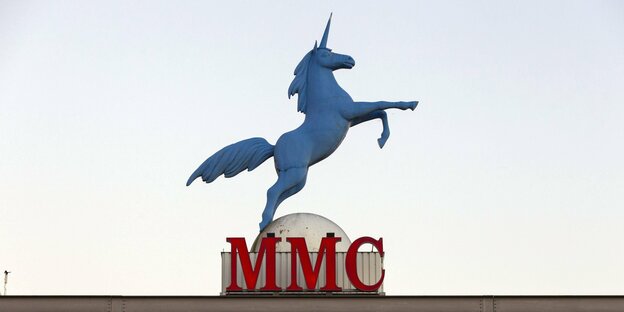Private studio operators complain about unfair competition from ARD and ZDF subsidiaries. The price war could intensify.

The MMC studios in Cologne-Ossendorf Photo: Future Image/imago
There is currently a lot of anger in Cologne: Private film and television studio operators, including MMC and EMG Studios Hürth, are complaining about unfair competition from ARD and ZDF subsidiaries. Whether it's the show “I'm a Celebrity – Get Me Out of Here!” The aftermath” or “Celebrity Big Brother”: more and more private television formats that independent companies have been producing for years are lost in public competition.
You could say free competition, but that is exactly what MMC or EMG doubt. “We know how to implement 'Celebrity Big Brother' well and profitably, but last year we didn't get the contract,” complains MMC CEO Dirk Schweitzer. Production company Endemol Shine said the offer was too high. On the other hand, Bavaria Studios was able to score points.
The company, which is ultimately owned by public broadcasters, rented unused rooms at the WDR site in Cologne-Bocklemünd last summer to offer studio capacity in the most populous state.
“Bavaria's offer should have been much more profitable,” concludes Schweitzer, “even though for years we already had structures that Bavaria had to build first in Cologne, including earthworks and infrastructure.” Many in the sector wonder if there is hidden cross-subsidy under public law so that the subsidiary can undercut private sector offers.
The cake is too small.
“I can understand that there are doubts. In any case, there should not be a self-destructive price war, because that would harm the entire sector,” warns Stefan Hoff. The CEO of seeyouhere Communication GmbH is considered an expert in this field.
The construction of the Bavaria studios is, to put it mildly, a bit confusing. It is a public law subsidiary of public law subsidiaries including WDR Mediagroup, MDR Media and SWR Media Services.
“It is not known what investments were necessary, but they must have been important,” suspects the head of EMG, René Steinbusch, actually a competitor of MMC, about the change of “Big Brother”. He is not the only one who assumes that public information, such as rental prices, “is not displayed transparently and therefore cannot be assigned.” One could also talk about concealment. Neither Bavaria nor WDR responded to taz's request. A spokesman for Bavaria simply responded: “We are not aware of any accusations from the competition in connection with the operation of the studio in Bocklemünd.”
Excess capacity is gaining strength again
The last few years have been exceptionally good for studio operators: this may be due to Corona, as filming in studios was safer and more controlled, and the expansion of streaming services in the US, which also featured local production . But the good order situation has ended due to the weakening of the advertising industry and the stagnation of the number of subscribers at Netflix and Co. Thus, the historical excess capacity in the study area is gaining strength again.
Because almost all large film and television studio complexes in Germany can hardly operate profitably. In the competition between the media in North Rhine-Westphalia, Bavaria, Berlin and Hamburg, fueled by policy makers, too many production facilities have been built with public funds.
This also applies to the MMC studios in Cologne-Ossendorf, built in the 90s and intended to turn the cathedral city into a media metropolis: financed by a real estate fund for the German super-rich and supported by the Sparkasse Köln-Bonn, which even became the owner, which was later prevented with the support of the EU. Now the MMC, where international film productions such as “The Fabulous World of Amelie” were filmed, belongs to a financial investor.
In any case, in the boom year 2022, total studio sales in the Federal Republic were estimated at around 200 million euros. This figure is likely to have dropped significantly last year. And this year the drop will likely be even greater, further intensifying the price war for all players in one way or another. The pie is usually around 150 million euros, it is too small for all the actors and, above all, it is largely financed by society: the German film and television industry would hardly be viable without retransmission fees and state financing.